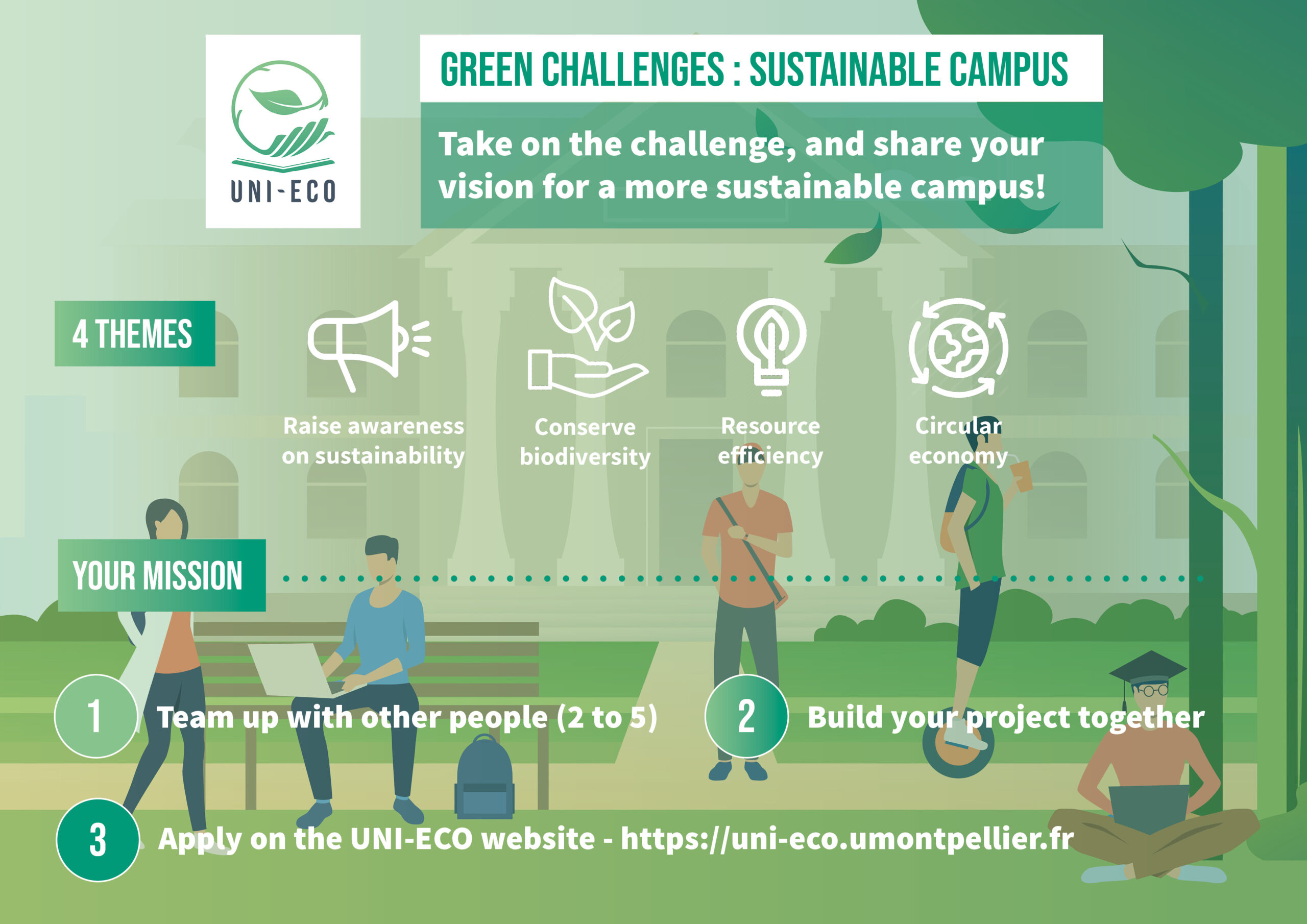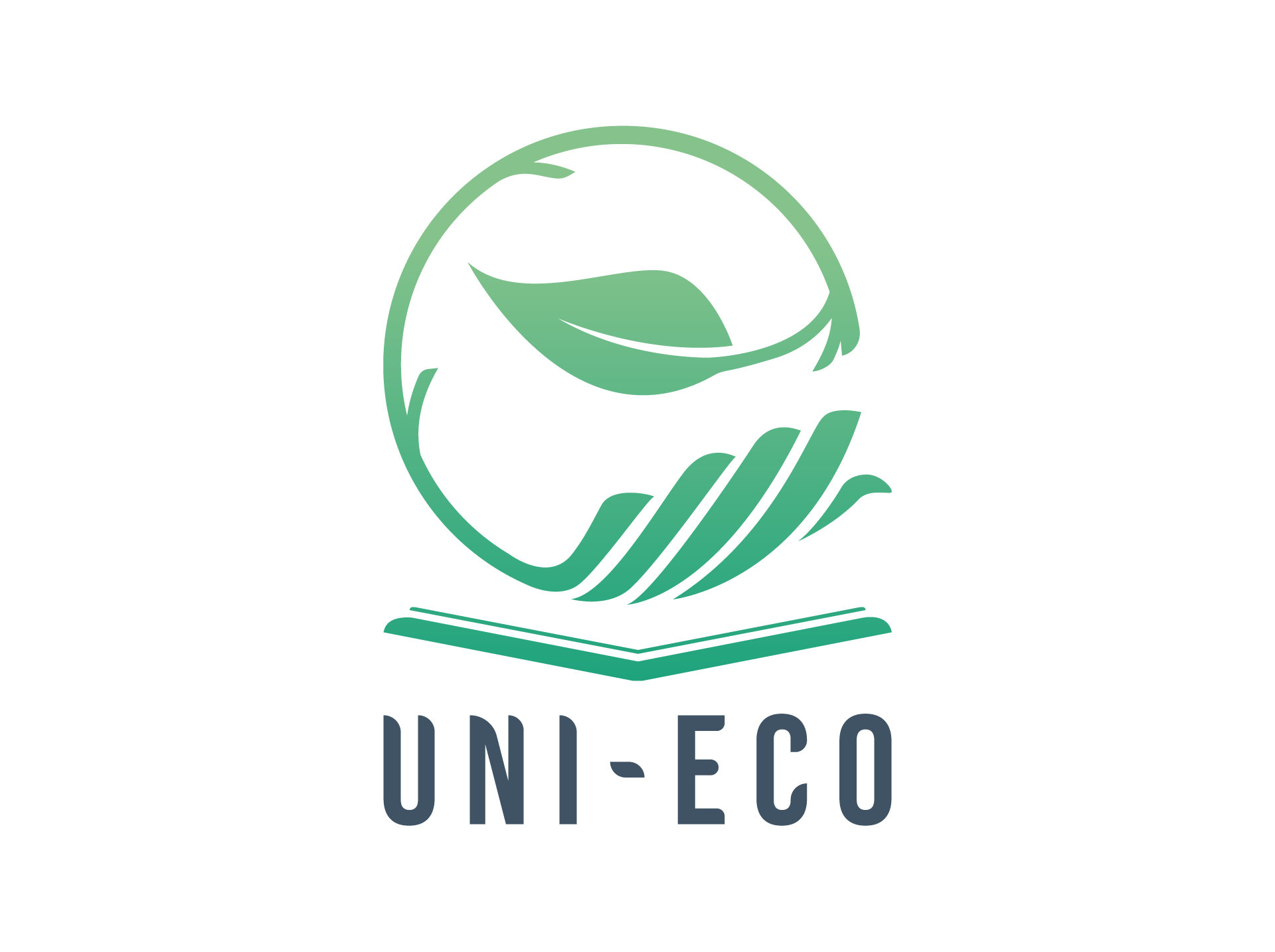Green Challenges
The Green Challenges campaign
A Green Challenge is a challenge issued to campus users to develop solutions that will improve sustainability at their University campus, working toward the United Nations Sustainable Development Goals (SDGs).
The objective of the “Green Challenges campaign” is to encourage campus users to get involved in the community by proposing projects as part of UNI-ECO that promote good practices within the institution, and the exchange of ideas between the partner universities.
Each partner university manages its own internal call for projects within the framework of the “Green challenges” in 2022.
The common themes of the call for projects within “Green challenges 2022” were defined based on the results of a “State of the Art on Sustainable Development in Higher Education Institutions” study conducted across the partner institutions during the first phase of UNI-ECO, which included university self-assessments and surveys of students and staff. After the identification of the priority areas for action, the common themes of the call for projects within “Green challenges 2022” have been defined as follows:

1. Raising awareness about SDGs and sustainability in general
The Sustainable Development Goals (SDGs), also known as the Global Goals, were adopted by the United Nations in 2015 as a universal call to action to end poverty, protect the planet, and ensure that by 2030 all people enjoy peace and prosperity. The 17 SDGs are integrated—they recognize that action in one area will affect outcomes in others, and that development must balance social, economic and environmental sustainability. Raising public awareness is important to increase enthusiasm and support, stimulate self-mobilisation and action, and mobilise local knowledge and resources. Mini-projects to address this Green Challenge could include (for example) hosting an educational event/ organizing a voluntary project/ launching an information campaign, etc. What mini-project idea of your own would you like to work on?
2. Actions to conserve and increase biodiversity on campus
Biodiversity has been dramatically affected in negative ways by humans over the past century, to the point where more than 60% of animal species have been wiped out since 1970, according to the WWF Living Planet Report (2020). Actions to conserve and increase biodiversity on campus could include projects with local/ national botanical gardens; ways of enhancing biodiversity on campus; measuring/monitoring biodiversity on campus; and awareness programmes about the importance of biodiversity. What mini-project idea of your own would you like to work on?
3. Moving towards a circular economy at university
The circular economy is a model of production and consumption, which involves sharing, leasing, reusing, repairing, refurbishing and recycling existing materials and products as long as possible. In this way, the life cycle of products is extended. In practice, it implies reducing waste to a minimum. When a product reaches the end of its life, its materials are kept within the economy wherever possible. These can be productively used again and again, thereby creating further value. Mini-projects to address this Green Challenge at university could include (for example) encouraging the reuse of school supplies/ promoting the collection and exchange of goods among campus users instead of throwing them away/ raising awareness of waste management, etc. What mini-project idea of your own would you like to work on?
4. Finding ways to enhance efficiency (resource use -water, energy-, alternatives to plastic, transport/mobility etc.)
Resource efficiency means using the Earth's limited resources in a sustainable manner while minimising impacts on the environment. It is key to move towards a green economy and contribute to global sustainability. Ways to enhance efficiency at university could include projects to reduce water and/or energy consumption/ proposing solutions to reduce pollution by using sustainable alternatives (i.e. to plastic)/ reducing the environmental impact of mobility, etc. What mini-project idea of your own would you like to work on?
Check the current proposals from the different universities you might want to join:
Green Challenges 2021
1. Practices that will bring the university closer to a Zero Waste goal
With waste projected to grow, globally, by 70% by 2050, there is an urgent need to eliminate, minimise and repurpose waste in all sectors of society. ‘Zero waste’ is a set of principles focused on waste prevention, which encourages the redesign of products to enable them to be reused/ repaired. The goal is for no waste to be sent to landfills, incinerators or the ocean. Reusing, repurposing and repair of goods is preferable to disposal. Recycling is a second best option but also valid. Mini-projects to address this Green Challenge could include (for example) eliminating sources of waste/ educating a portion of the university community about waste prevention/ improving recycling rates/ eliminating single-use (disposable) plastics/ upcycling or repurposing university waste. What mini-project idea of your own would you like to work on?
2. Reducing the carbon footprint related to transport at the university
Think of ‘carbon footprint’ as a measurement of how much an organisation is contributing (negatively) to climate change. The greater the carbon footprint of something (which is a measure of the volume of greenhouse gases [global warming gases] emitted by an activity or item purchased by the university), the more we have contributed to climate change [also known as ‘global warming’].
We know that transport (flights/ commuting/ student travel to other universities) accounts for as much as 50% of a university’s carbon footprint, so reducing travel has direct impacts on climate change. Projects suggested for this topic could include reducing the impact of long-distance traveling; choosing more environmentally friendly modes of commuting (walking/ cycling/ public transport); replacement of vehicles with zero emission vehicles; raising awareness about sustainability transport options; or measuring traffic at the campus for example. What mini-project idea of your own design, would you like to work on?
3. Actions to support and enhance biodiversity
Biodiversity has been dramatically affected in negative ways by humans over the past century, to the point where more than 60% of animal species populations have been wiped out since 1970, according to the WWF Living Planet Report (2020). Actions to support and enhance biodiversity could include projects with local/ national botanical gardens; ways of enhancing biodiversity on campus; measuring/monitoring biodiversity on campus; and awareness programmes about the importance of biodiversity. What mini-project idea of your own design, would you like to work on?
4. Reducing the environmental footprint of catering at the university
Food waste is the third biggest global contributor to climate change [global warming] on our planet. The environmental footprint of something is a measure of the negative impact on the environment caused by an activity or item purchased by the university. Food waste can emit a lot of methane and carbon dioxide – both of which are greenhouse gases. Some foods travel thousands of miles across the planet before getting to our plates, so buying locally sourced food will reduce the air pollution associated with transport of food.
Mini projects for this topic could include themes such as increasing sustainable catering options throughout the university (e.g. offering a wider selection of vegan/ vegetarian options, or buying organic ingredients or Fair Trade products); reducing food waste on campus; measuring/monitoring food waste; educating the university community about better food choices; or insisting on reusable or biodegradable plates and cutlery. Whatever mini project you think of to reduce our environmental footprint from food, let us know what you would like to focus on!





